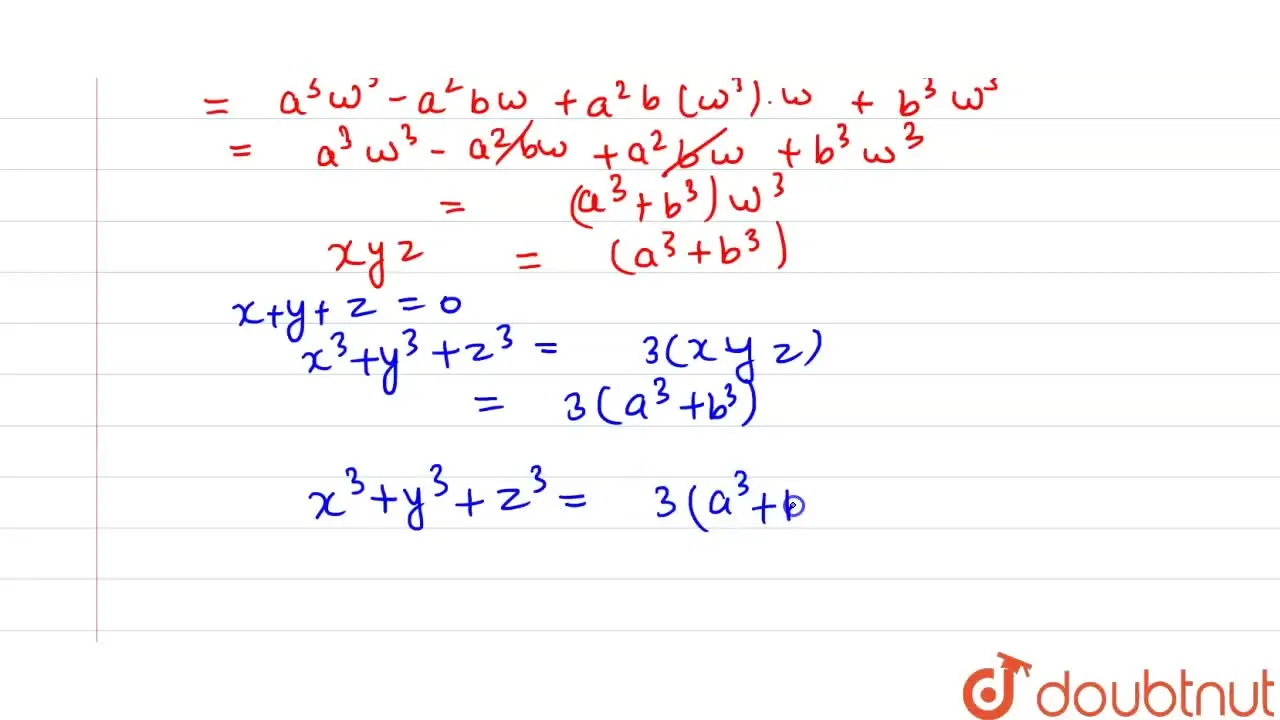If x=a+b,y=aω2+bω,z=aω+bω2, then show that x3+y3+z3=3(a3+b3)
The correct Answer is:3(a3+b3)
Step by step video, text & image solution for If x= a + b, y= a omega^(2) + b omega, z= a omega + b omega^(2), then show that x^(3)+ y^(3) + z^(3)= 3(a^(3) + b^(3)) by Maths experts to help you in doubts & scoring excellent marks in Class 11 exams.
Related Playlists
- BOOK - ICSECHAPTER - COMPLEX NUMBERSEXERCISE - Exercise (A)27videos
COMPLEX NUMBERS
- BOOK - ICSECHAPTER - COMPLEX NUMBERSEXERCISE - Exercise (B)69videos
COMPLEX NUMBERS
- BOOK - ICSECHAPTER - COMPLEX NUMBER EXERCISE - MULTIPLE CHOICE QUESTIONS34videos
COMPLEX NUMBER
- BOOK - ICSECHAPTER - COMPOUND AND MULTIPLE ANGLES EXERCISE - CHEPTER TEST23videos
COMPOUND AND MULTIPLE ANGLES
Similar Questions
If x=a+b,y=aα+bβ,z=aβ+bα where αandβ are complex cube roots of unity , show that x3+y3+z3=3(a3+b3)
View SolutionShow that (x+ωy+ω2z)(x+ω2y+ωz)=x2+y2+z2−yz−zx−xy
View SolutionIf ω is a non-real cube root of unity, then Δ=∣∣ ∣ ∣∣a1+b1ωa1ω2+b1a1+b1+c1ω2a2+b2ωa2ω2+b2a2+b2+c2ω2a3+b3ωa3ω2+b3a3+b3+c3ω2∣∣ ∣ ∣∣ is equal to
View SolutionShow that x3+y3=(x+y)(ωx+ω2y)(ω2x+ωy)
View SolutionIf 1,ω,ω2 are the cube roots of unity, prove that
(x−y)(xω−y)(xω2−y)=x3−y3View SolutionIf 1,ω,ω2 be three roots of 1, show that: (1+ω)3−(1+ω2)3=0
View SolutionLet ω=eiπ3anda,b,c,x,y,z be non-zero complex numbers such that a+b+c=x,a+bω+cω2=y,a+bω2+cω=z.Then, the value of |x|2+|y|2|+|y∣∣2|a|2+|b|2+|c|2
View SolutionIf xa=yb=zc show that x3a3+y3b3+z3c3=3xyzabc
View SolutionLet ω be a complex number such that 2ω+1=z where z=√−3. If∣∣1111−ω2−1ω21ω2ω7∣∣=3k, thenk is equal to : −1 (2) 1 (3) −z (4) z
View SolutionLet ω be a complex number such that 2ω+1=z where z=√−3. If∣∣ ∣ ∣∣111−ω2−1ω21ω2ω7∣∣ ∣ ∣∣=3k, then k is equal to :
View Solution


